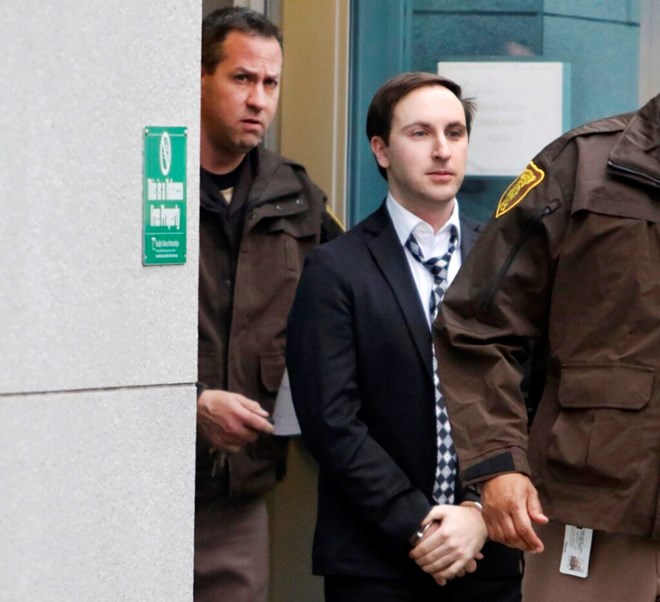
Tuesday April 6, 2021
Mark Cardilli Jr. was convicted of manslaughter and sentenced to prison for shooting Isahak Muse.

Mark Cardilli Jr. leaves the Cumberland County Courthouse in Portland on Dec. 27, 2019, after being found guilty of manslaughter in the killing of Isahak Muse. Jill Brady/Staff Photographer
The state’s top court will decide whether to uphold the manslaughter conviction of a Portland man who fatally shot his sister’s boyfriend in 2019.
Mark Cardilli Jr. is current serving 7½ years in prison for the death of 22-year-old Isahak Muse. He was initially charged with murder, but Superior Court Justice Nancy Mills found him guilty of the lesser offense after a bench trial. She imposed a total sentence of 11 years but suspended 3½.
Cardilli, now 26, admitted to killed Muse during a fight at the Cardilli home in Portland’s Riverton neighborhood, but he said he was defending himself and his family. Muse was visiting his girlfriend that night, and the conflict started as a disagreement over whether he could spend the night. The entire family was involved in a verbal and physical altercation before the shooting.
Mills ultimately found that the law did not allow Cardilli to use deadly force during that confrontation in the early-morning hours of March 16, 2019. In her ruling, she found that the state did not prove that Cardilli was not acting in self defense, but she found his belief that he needed to shoot Muse to be unreasonable. Her conclusion supported neither a murder conviction nor an acquittal, and the result was the guilty verdict for manslaughter.
Cardilli appealed his conviction, and the Maine Supreme Judicial Court heard oral arguments in the case Tuesday.
Attorneys Jamesa Drake and Rory McNamara, who are representing Cardilli on appeal, argued in their written briefs that it was reasonable for him to believe Muse did not have permission to be in the house and that Cardilli needed to shoot Muse to prevent injury to himself or his family.
“The law does not require anyone in his or her own home to keep suffering bodily injury from an interloper,” Drake said during the oral arguments. “In fact, millions of Americans buy a gun in order to defend their home out of the concern for situations precisely like the one in this case, to protect their castle when all other measures have failed.”
Assistant Attorney General Leanne Robbin in her brief said it was not reasonable for Cardilli to consider Muse an intruder just because he stayed past the curfew imposed by his girlfriend’s parents. He had been invited into the home and stayed there for hours, as he had on other nights. Because Muse was not an intruder, Robbin said, Cardilli did not have the legal grounds to shoot him.
“The question of whether a person is an intruder or an invitee makes a critical difference as to whether a resident may legally use deadly force to get them to leave the home,” Robbin said. “As the evidence showed and the court found, Isahak was no intruder.”

Isahak Muse/ SUPPLIED
The justices questioned both attorneys about when a person can legally use deadly force against another in their own home.
“The justification for deadly force is a big deal,” Chief Justice Andrew Mead said to Drake. “There’s a big difference between grabbing the person by the pants and throwing them out the door and pulling out a .44 and blasting them because they won’t leave. I can’t imagine the Legislature intended that to be the case. So I take issue with your argument that being able to evict someone is the basis of this justification.”
Drake argued that the law gives “great ability” to homeowners to expel people they do not want in their homes.
“To suggest that Mark is somehow required to do something other that what he did, which is use verbal commands, use non-deadly force, use the threat of deadly force, and simply continue to take the blows, is drastically at odds with what any reasonable Mainer would understand the law permits,” she said.
The justices also seemed interested in the difference between a person who has been invited in and one who has not. In her brief and her argument, Robbin returned to this question multiple times, adding that Muse was not armed.
“If the person has a reasonable belief that the other person is going to inflict bodily injury, they can use deadly force,” Mead asked Robbin. “Do you believe that’s a low bar?”
“I believe that that is only the case if the other person is an intruder,” Robbin responded.
“Isahak Muse was not an intruder, so there was not a right to shoot him in the back to get him to leave,” she added later, referencing the forensic evidence about the fatal shots.
The Cardillis are white, and Muse was Black. Since the first days after the fatal shooting, the role of racism was a constant question.
While police investigated the incident, local Muslim leaders voiced their concern that it was a hate crime. When Mills set bail at $50,000 and allowed Cardilli to wait for his trial at home, protesters questioned whether a Black defendant would have had the same opportunity. And when Chelsey Cardilli took the stand at the trial, she said her brother made racist statements about Muslims, Somali people and Black people.
In her ruling, Mills wrote that she did not find the young woman’s testimony to be credible, and her verdict did not otherwise raise those allegations. In the appeal, neither side discussed racism as a factor in the case.
Cardilli is serving his sentence at the Maine Correctional Center in Windham. He faced a mandatory minimum sentence of four years in prison because he used a firearm to cause the death of another person. The maximum penalty for manslaughter is 30 years.
The court does not have a timetable to issue its decision.